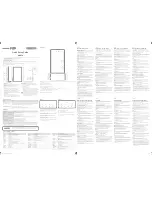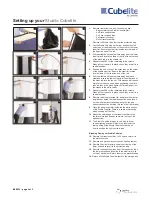
P
AGE
10
Section 6 - T
Section 6 - T
Section 6 - T
Section 6 - T
Section 6 - Troubleshooting
roubleshooting
roubleshooting
roubleshooting
roubleshooting
6.1 CHECKING SENSOR OPERATION
6.1 CHECKING SENSOR OPERATION
6.1 CHECKING SENSOR OPERATION
6.1 CHECKING SENSOR OPERATION
6.1 CHECKING SENSOR OPERATION
Determine whether the sensor or instrument is defective by using the troubleshooting section in
the instrument operating manual. If the sensor is suspect, check it using this procedure:
1.
Disconnect the sensor from the instrument (or junction box if interconnect cable is
used).
3.
With the sensor at a temperature between 23°C and 27°C, measure the resistance
between the red and yellow wires with an ohmmeter. The reading should be between
1090 and 1105 ohms.
4.
Measure the resistance between the white and blue wires. The reading should be less
than 5 ohms. Now measure the resistance between the green and yellow wires. The
reading should also be less than 5 ohms.
5.
Place the ohmmeter to its highest range and measure the resistance between the
shield and white wires. The reading should indicate infinity (open circuit).
•
If any one of the resistance checks in the previous steps is incorrect, the sensor is
probably defective. Contact Anderson Instrument Company for details on arrang-
ing a sensor replacement.
•
If the resistance checks are correct, the sensor may still be defective. In this case,
more extensive troubleshooting is required. Please consult the Anderson Instru-
ment Company at (800) 833-0081 for details.
Section 7 - Ordering Matrix
Section 7 - Ordering Matrix
Section 7 - Ordering Matrix
Section 7 - Ordering Matrix
Section 7 - Ordering Matrix
PROCESS CONNECTION
0
2" Tri-Clamp
®
PRODUCT CONTACT
0 PVDF
1
PFA Teflon
®
WIRING STYLE
1
Sealed cable (20 ft.)
w/ Strain Relief
2
Sealed cable (20 ft.)
w/ male 1/2" NPT & Strain Relief
JUNCTION BOX*
0
No junction box
1
Thermoplastic surface mount junction box
INTERCONNECT CABLE LENGTH**
00 No junction box
05 25 ft. (additional cable)
10 50 ft. (additional cable)
15 75 ft. (additional cable)
20 100 ft. (additional cable)
25 125 ft. (additional cable)
30 150 ft. (additional cable)
H
C 1
0





























